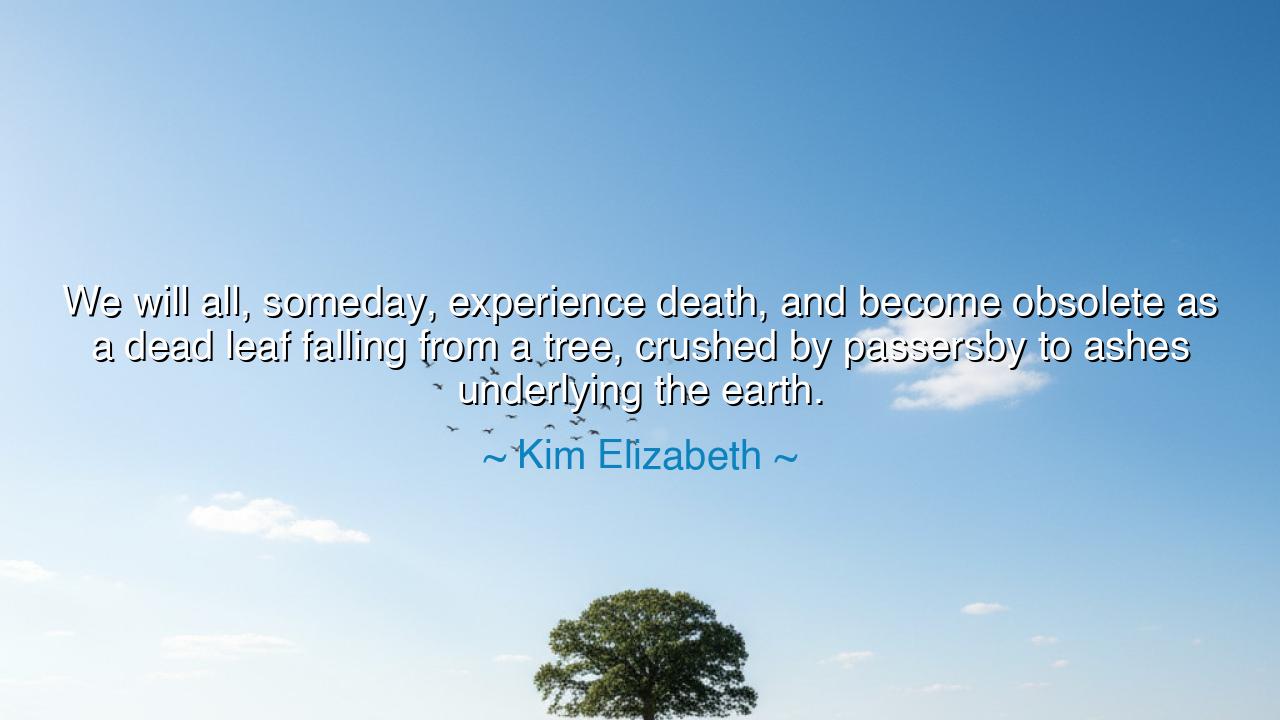
We will all, someday, experience death, and become obsolete as a
We will all, someday, experience death, and become obsolete as a dead leaf falling from a tree, crushed by passersby to ashes underlying the earth.






The poet Kim Elizabeth, whose verses often wander between beauty and melancholy, once wrote: “We will all, someday, experience death, and become obsolete as a dead leaf falling from a tree, crushed by passersby to ashes underlying the earth.” In these haunting words, she reveals the eternal truth that mortality is the great equalizer, that all living things — from kings to beggars, from lovers to poets — will one day return to dust. Her imagery is not cruel, but natural; not despairing, but awakening. Like the ancients who spoke of the cycle of life, she reminds us that death is not a punishment, but a transformation — a falling of the leaf that nourishes the roots for what is yet to come.
From the beginning of time, humanity has feared and revered death in equal measure. The ancients called it the final teacher, the last veil between ignorance and understanding. In Kim Elizabeth’s vision, death is not an enemy to be conquered but a natural conclusion — as inevitable as the turning of the seasons. Her metaphor of the fallen leaf speaks to the humility of existence. Just as every leaf bursts green in the spring, glows gold in autumn, and then surrenders to the soil, so too must every human life follow its course. The poet’s image of the passerby crushing the leaf underfoot reminds us that even memory fades, that time forgets all things, and yet — from that forgetting — new life begins.
To become “obsolete” is a painful word to the ego, but a liberating truth to the soul. The ancients, too, wrestled with this paradox. Marcus Aurelius, the philosopher-emperor of Rome, once wrote: “All that we see will soon perish, and those who remember it will soon perish as well.” Yet he did not despair. He found peace in knowing that transience gives life its meaning. The fallen leaf is not wasted; it becomes part of the earth that feeds the tree once more. Likewise, the human spirit, though forgotten in name and form, endures in the quiet continuity of existence. To understand this is to live not in fear, but in reverence — to cherish every moment, knowing it will not last, yet believing it contributes to something eternal.
The origin of Kim Elizabeth’s words springs from her lifelong meditation on life, art, and the passage of time. A poet who lived with an awareness of both beauty and impermanence, she wrote often of decay, of ghosts, of the quiet dignity in endings. Her imagery of the leaf beneath the feet of passersby captures the humility that art and wisdom require: that no one, no matter how great, escapes the cycle of renewal. We all feed the earth we walked upon. In her view, this is not tragedy but balance — the completion of a sacred circle.
Consider the story of Emperor Ashoka, the mighty ruler of India. After years of conquest and bloodshed, he looked upon the battlefield of Kalinga and saw not triumph, but a field of death. In that moment, he understood the futility of earthly power — how every empire, no matter how vast, will one day fall and be forgotten. From that realization, he turned toward peace and enlightenment. He learned, as Kim Elizabeth teaches, that to die is not to be destroyed, but to be renewed in spirit. For even when the leaf falls, the tree remembers; even when we perish, our actions become part of the soil that sustains others.
The crushing of the leaf is the poet’s way of reminding us of humility — that no matter our beauty, achievements, or pride, time will reduce us to dust. Yet within that dust lies immortality, for from it springs new life. The great civilizations of Egypt, Greece, and China — all their glories now lie buried beneath layers of earth, yet their wisdom still nourishes the minds of those who came after. In this way, the fallen leaf lives on through the tree’s continued growth. Obsolescence is not annihilation; it is transformation. To live fully is to accept that one’s purpose may not be eternal in form, but eternal in effect.
The lesson, then, is this: embrace impermanence as the source of meaning. Do not cling to youth, wealth, or fame, for these are the colors of autumn, destined to fade. Instead, plant goodness, kindness, and wisdom into the soil of time, where they may grow beyond you. Live with the awareness that you are both the leaf and the earth, both the fleeting and the eternal. When death comes — as it will for all — let it find you not grasping, but giving; not fearing, but understanding that your fall is part of a greater rising.
Thus, Kim Elizabeth’s words echo like a sacred chant through the corridors of mortality: that we are all leaves upon the same tree of life, destined to fall, to decay, and to become the nourishment of what will come after us. To live with this knowledge is to live wisely — with gentleness, with gratitude, and with peace. For though we may be “crushed by passersby,” our essence remains, mingled with the soil, whispering to the roots of tomorrow: “All things must end — but nothing is ever truly lost.”






AAdministratorAdministrator
Welcome, honored guests. Please leave a comment, we will respond soon